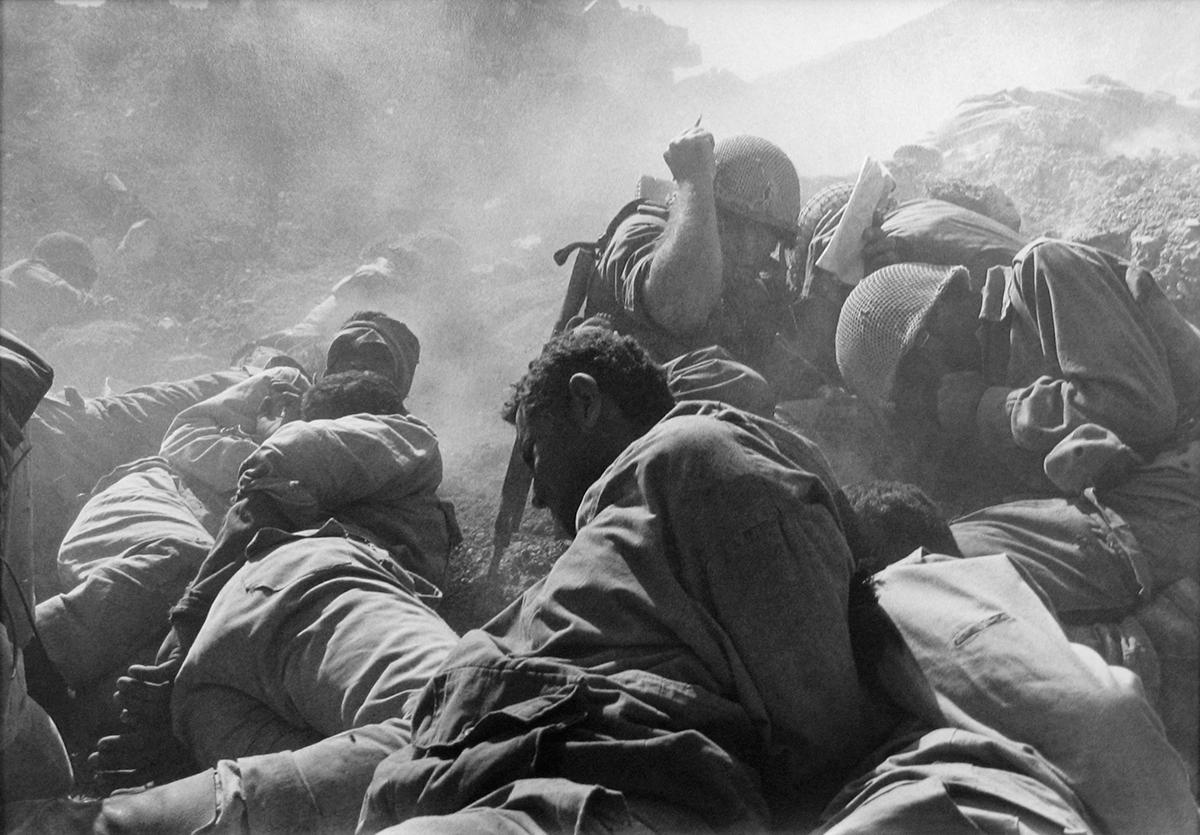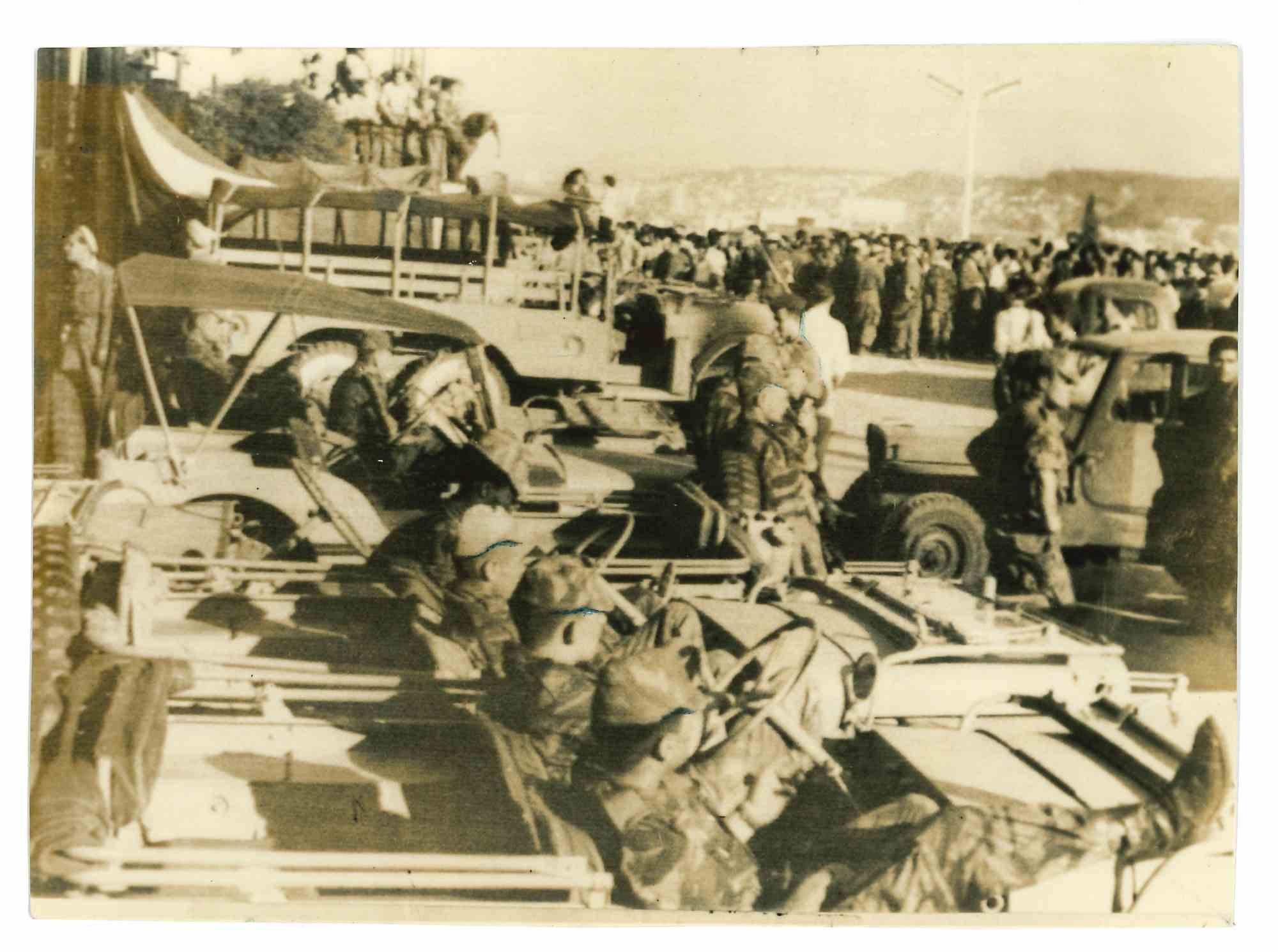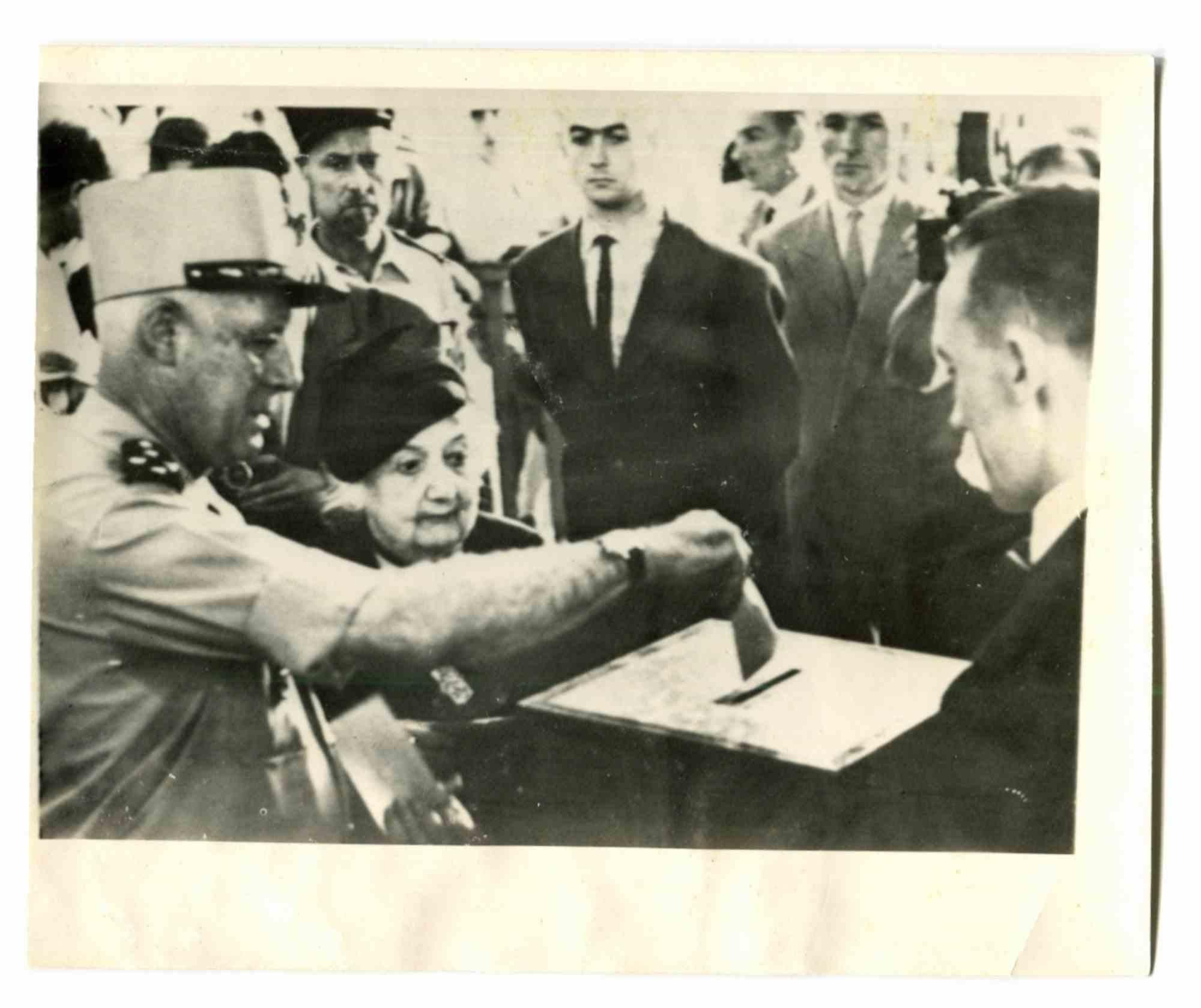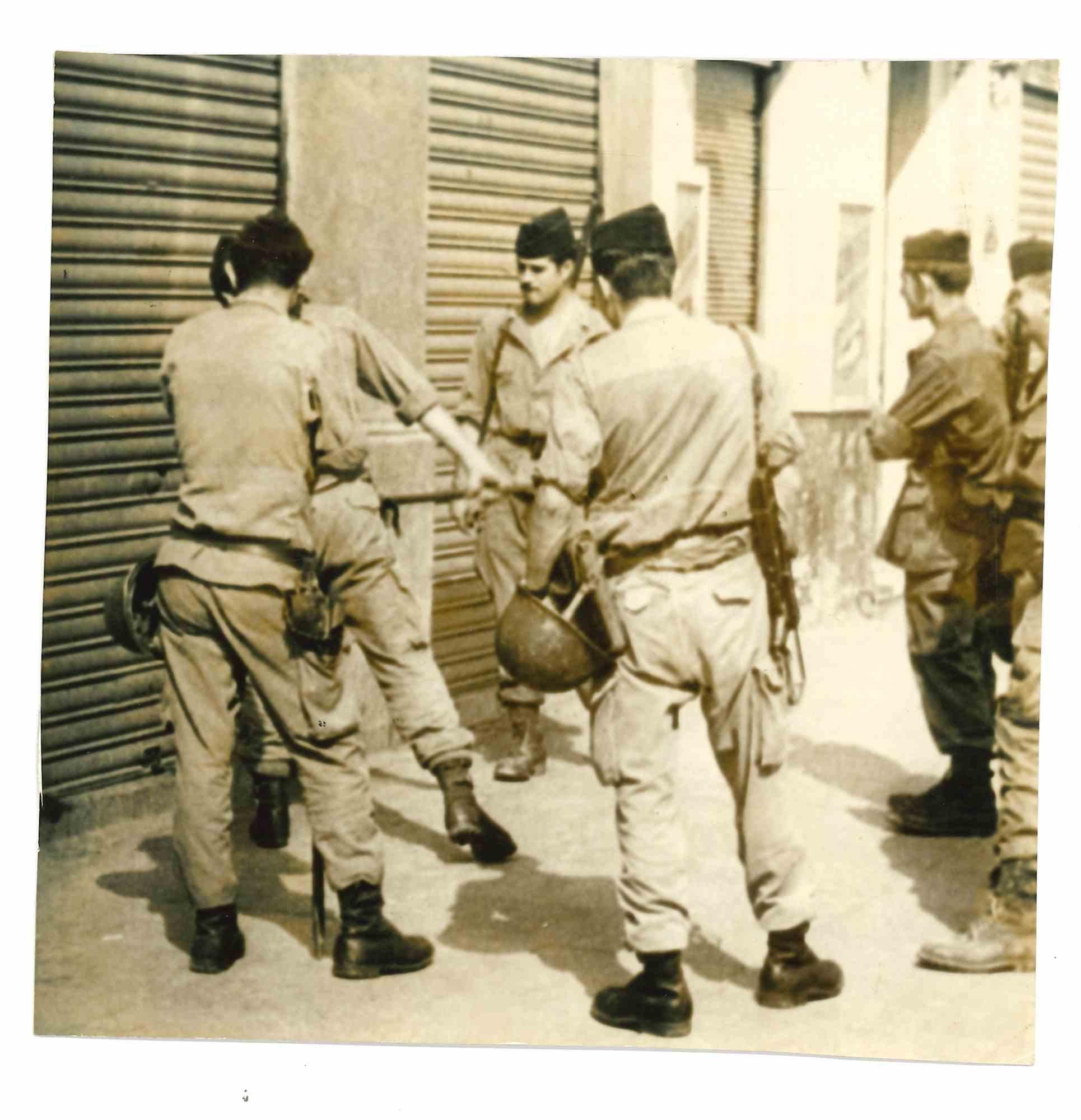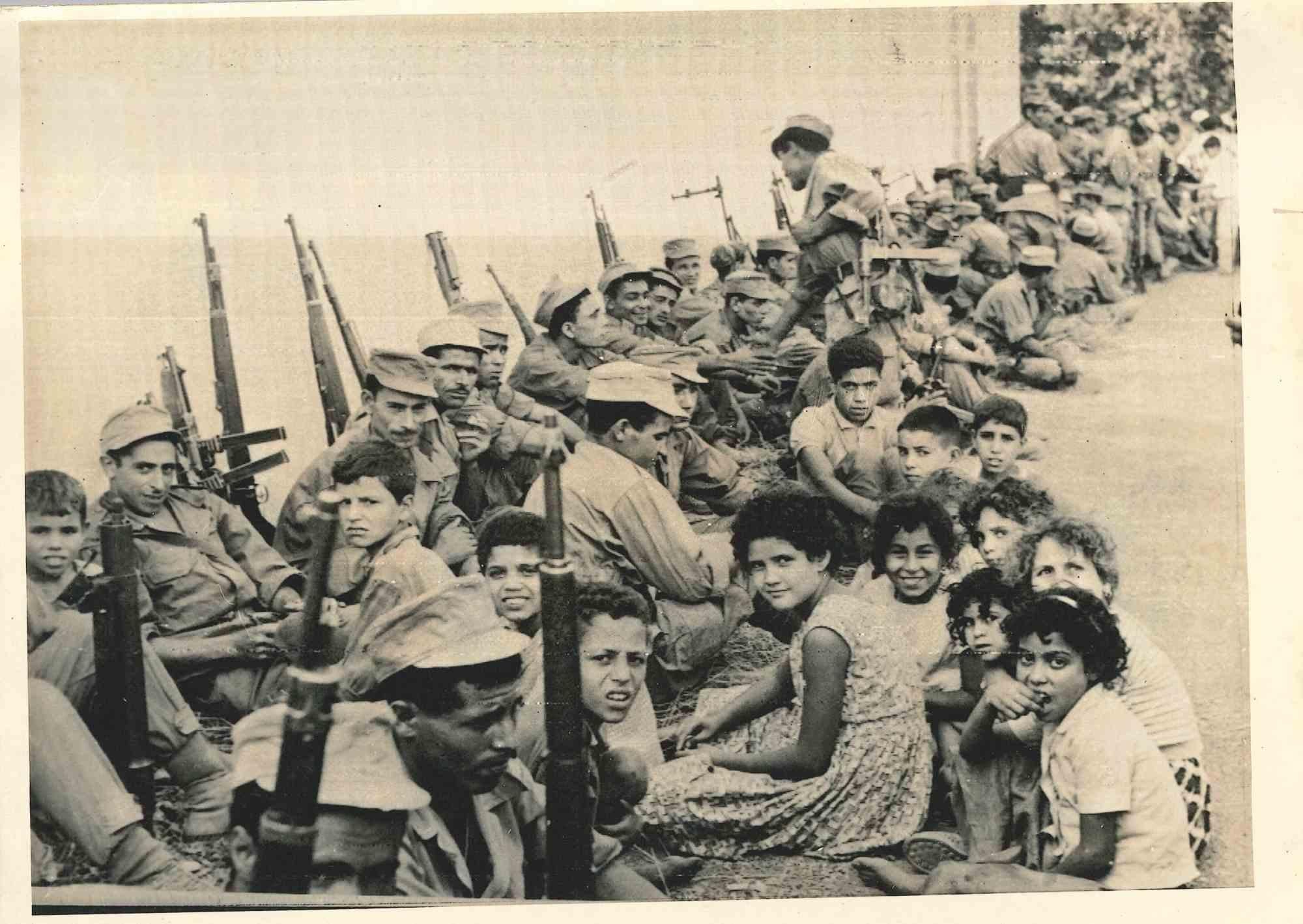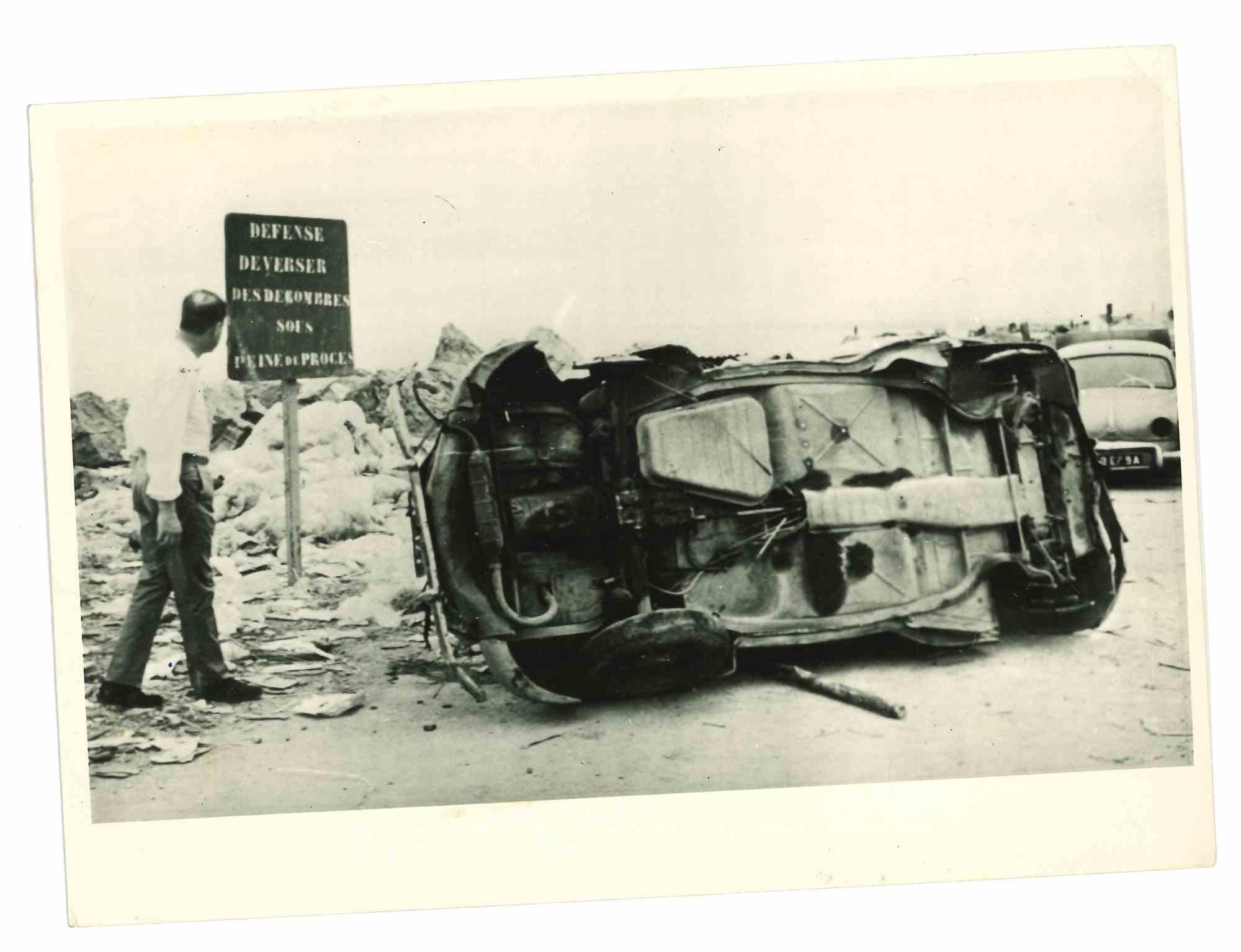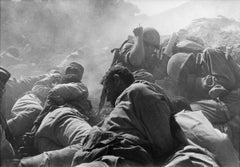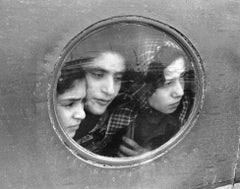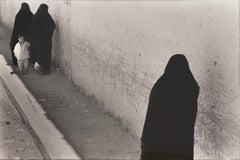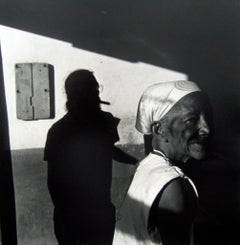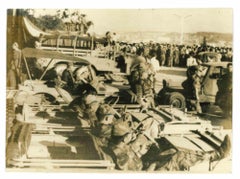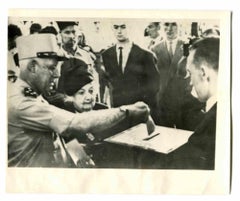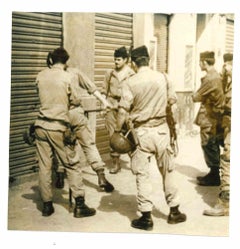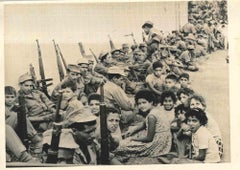Items Similar to Crossing the Suez Canal, Yom Kippur War by Micha Bar-Am, 1973
Video Loading
Want more images or videos?
Request additional images or videos from the seller
1 of 11
Micha Bar-AmCrossing the Suez Canal, Yom Kippur War by Micha Bar-Am, 19731973
1973
$1,750
£1,316.71
€1,521.22
CA$2,473.21
A$2,685.42
CHF 1,422.13
MX$32,915.58
NOK 17,599.39
SEK 16,630.49
DKK 11,353.76
About the Item
Crossing the Suez Canal, Yom Kippur War by Micha Bar-Am presents a brief moment of joy amidst a dark time. Two men smile while riding in a car, with other men looking onward with a blank face. One man has a bandage wrapped around his head, while the other wears an eye patch. The events preceding and upcoming are unknown, but the men found a glimpse of happiness.
Crossing the Suez Canal, Yom Kippur War by Micha Bar-Am is listed as a 12.5 x 18 inch gelatin silver print, available in an edition of 300. This photograph is signed with edition number in ink on the print margin. Crossing the Suez Canal is part of Micha Bar-Am's portfolio, published by Beth Hatefutsoth, The Nahum Goldman Museum, Museum of The Jewish Diaspora.
Born in Berlin in 1930, Micha Bar-Am emigrated to Israel (then Palestine) with his parents at age six. During his youth, Bar-Am became active in the pre-state underground and was drafted in 1948. After serving in the war, he helped found the Kibbutz Malkiya in Galilee. Soon after, Bar-Am moved to Kibbutz Gesher-Haziv, where he took his first photographs of archeological digs in the Judean desert. He borrowed his camera from an American member of his kibbutz who teased that though Bar-Am’s photographs were better than his own, they would never be used, as Bar- Am was only a “kibbutz dilettante.” Bar-Am proved this statement wrong; his work was soon published in the Israeli Army magazine Bama Hana. In 1957, he was offered a full time job as a staff photographer for the magazine.
In the following years, Bar-Am continued to document the Israeli army. In 1967, he photographed the Six-Day War, during which he met Cornell Capa. Capa and Bar-Am became friends and he introduced Bar-Am to Magnum, a photographic co-operative where Bar-Am would become an associate. In 1968, Bar-Am began his career as a New York Times correspondent and documented the Israeli Palestinian conflict from Suez to the Golan Heights.
Bar-Am was closely involved with the founding of the International Center of Photography in 1974, working alongside Cornell Capa as a curator. He became the Curator of Photography for the Tel Aviv Art Museum in 1977. He left this position in 1992, and has been working on his own photography ever since.
Though often classified as such, Micha Bar-Am is not merely a photojournalist (an assignation Bar-Am himself refuses). His work represents more than documentation of the action of war. Bar-Am’s photography captures the changed lives and lifestyles of Israeli men and women as a result of the years of conflict. His carefully composed shots contain a thoughtfulness and artfulness often unseen within documentary photography. His work continues to be published and exhibited around the world.
- Creator:Micha Bar-Am (1930, Israeli)
- Creation Year:1973
- Dimensions:Height: 12.5 in (31.75 cm)Width: 18 in (45.72 cm)Depth: 0.01 in (0.26 mm)
- Medium:
- Movement & Style:
- Period:
- Condition:
- Gallery Location:Denton, TX
- Reference Number:Seller: 4954-091stDibs: LU21513408152
About the Seller
4.9
Recognized Seller
These prestigious sellers are industry leaders and represent the highest echelon for item quality and design.
Gold Seller
Premium sellers maintaining a 4.3+ rating and 24-hour response times
Established in 1995
1stDibs seller since 2013
335 sales on 1stDibs
Typical response time: <1 hour
- ShippingRetrieving quote...Shipping from: Denton, TX
- Return Policy
Authenticity Guarantee
In the unlikely event there’s an issue with an item’s authenticity, contact us within 1 year for a full refund. DetailsMoney-Back Guarantee
If your item is not as described, is damaged in transit, or does not arrive, contact us within 7 days for a full refund. Details24-Hour Cancellation
You have a 24-hour grace period in which to reconsider your purchase, with no questions asked.Vetted Professional Sellers
Our world-class sellers must adhere to strict standards for service and quality, maintaining the integrity of our listings.Price-Match Guarantee
If you find that a seller listed the same item for a lower price elsewhere, we’ll match it.Trusted Global Delivery
Our best-in-class carrier network provides specialized shipping options worldwide, including custom delivery.More From This Seller
View AllArtillery Barrage, Suez Canal, Yom Kippur War by Micha Bar-Am, 1973
By Micha Bar-Am
Located in Denton, TX
Artillery Barrage, Suez Canal, Yom Kippur War by Micha Bar-Am depicts soldiers amidst a battle. The men are laying on the ground, ducking for cover in the...
Category
1970s Contemporary Black and White Photography
Materials
Silver Gelatin
Jewish Refugees, Lydda Airport, Tel Aviv, Israel by Ruth Orkin, 1951
By Ruth Orkin
Located in Denton, TX
Jewish Refugees, Lydda Airport, Tel Aviv, Israel by Ruth Orkin depicts a window with three faces peering out into the world. A reflection of a large ship is cast onto these young fac...
Category
20th Century Modern Black and White Photography
Materials
Silver Gelatin
Three Figures in Black - Morocco by Paul Greenberg, 1994, Silver Gelatin Print
By Paul Greenberg
Located in Denton, TX
Three Figures in Black - Morocco by Paul Greenberg depicts four people walking on a sidewalk. A small child walks with two figures cloaked in black, and carries a white toy attached ...
Category
1990s Contemporary Black and White Photography
Materials
Silver Gelatin
Mira quien viene, Santiago de Cuba
By Mario Algaze
Located in Denton, TX
Signed, titled, and dated.
Mario Algaze is a contemporary Cuban-American photographer whose work articulates the counter-culture of Latin America, the Caribbean and Cuba.
In 1960, ...
Category
20th Century Contemporary Black and White Photography
Materials
Silver Gelatin
Surfing Florida Style by Al Satterwhite, 1969, Archival Pigment Print
By Al Satterwhite
Located in Denton, TX
Surfing Florida Style by Al Satterwhite depicts a young man surfing on the water. He holds a rope attached to a car, which tows him through the water a...
Category
1960s Contemporary Black and White Photography
Materials
Archival Pigment
Untitled, from the New Mexico Portfolio
By Van Deren Coke
Located in Denton, TX
Edition of 125
Signed and dated in ink on print margin.
Photograph is from The New Mexico Portfolio published in 1976 by the Center of the E...
Category
Late 20th Century Surrealist Black and White Photography
Materials
Silver Gelatin
$900 Sale Price
59% Off
You May Also Like
War in Algeria - Historical Photo - 1960s
Located in Roma, IT
War in Algeria- Historical Photo is a black and white vintage photograph realized in the 1960s. It belongs to historical album including photo reportages of historical events and pol...
Category
1960s Contemporary Figurative Photography
Materials
Photographic Paper
War in Algeria - General Raoul Salan - Historical Photo - 1960s
Located in Roma, IT
Algeria- - General Raoul Salan is a black and white vintage photograph realized in the 1960s. It belongs to historical album including photo reportages of historical events and polit...
Category
1960s Contemporary Figurative Photography
Materials
Photographic Paper
War in Algeria - Historical Photo - 1960s
Located in Roma, IT
War in Algeria- Historical Photo is a black and white vintage photograph realized in the 1960s. It belongs to historical album including photo reportages of historical events and pol...
Category
1960s Contemporary Figurative Photography
Materials
Photographic Paper
War in Algeria - Vintage Photo - 1960s
Located in Roma, IT
War in Algeria is a Vintage Photo photograph realized in the 1960s.
Good conditions and aged.
Category
1960s Contemporary Figurative Photography
Materials
Photographic Paper
War in Algeria - Historical Photo - 1960s
Located in Roma, IT
War in Algeria- Historical Photo is a black and white vintage photograph realized in the 1960s. It belongs to historical album including photo reportages of historical events and pol...
Category
1960s Contemporary Figurative Photography
Materials
Photographic Paper
War in Algeria - Historical Photo - 1960s
Located in Roma, IT
War in Algeria- Historical Photo is a black and white vintage photograph realized in the 1960s. It belongs to historical album including photo reportages of historical events and pol...
Category
1960s Contemporary Figurative Photography
Materials
Photographic Paper
